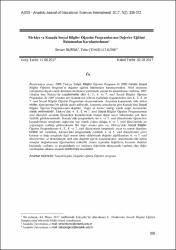Türkiye ve Kanada sosyal bilgiler öğretim programlarının değerler eğitimi bakımından karşılaştırılması

Göster/
Erişim
info:eu-repo/semantics/openAccessTarih
2017Yazar
Anadolu Üniversitesi
Bursa, Sercan
Çengelci Köse, Tuba
Üst veri
Tüm öğe kaydını gösterKünye
Bursa, S, Çengelci Köse, T. (2017). Türkiye ve Kanada sosyal bilgiler öğretim programlarının değerler eğitimi bakımından karşılaştırılması. Anadolu Journal of Educational Sciences International (AJESI), 7 (2), 338-372.Özet
Araştırmanın amacı, 2005 Türkiye Sosyal Bilgiler Öğretim Programı ile 2005 Kanada Sosyal
Bilgiler Öğretim Programı’nı değerler eğitimi bakımından karşılaştırmaktır. Nitel araştırma
yaklaşımına dayalı olarak doküman incelemesi yöntemiyle yapılan bu araştırmanın verilerini, 2005
yılından beri Türkiye’de uygulanmakta olan 4., 5., 6. ve 7. sınıf Sosyal Bilgiler Öğretim
Programları ile 2005 yılından beri Kanada’nın Alberta eyaletinde uygulanmakta olan 4., 5., 6. ve
7. sınıf Sosyal Bilgiler Öğretim Programları oluşturmaktadır. Araştırma kapsamında elde edilen
veriler, tümevarımsal bir şekilde analiz edilmiştir. Araştırma sonuçlarına göre Kanada’daki Sosyal
Bilgiler Öğretim Programlarında değerler, “değer ve tutum” başlığı içinde değer kazanımları
olarak verilmektedir. Türkiye’deki 4., 5., 6. ve 7. sınıf Sosyal Bilgiler Öğretim Programlarında
sınıf düzeyleri arasında öğrencilere kazandırılmak istenen değer sayısı bakımından çok fazla
farklılık görülmemektedir. Kanada’daki programlarda ise 4. ve 5. sınıf düzeylerinde öğrencilere
kazandırılması amaçlanan değerlerin sayı olarak yoğun olduğu, 6. ve 7. sınıf düzeylerinde ise
yoğunluğun azaldığı görülmektedir. Bir diğer sonuca göre ise, Türkiye’deki Sosyal Bilgiler
Öğretim Programlarının 4., 5., 6. ve 7. sınıf düzeylerinin tamamında soyut ve somut değerlere
birlikte yer verilirken, Kanada’daki programlarda özellikle 4. ve 5. sınıf düzeylerinde çevre
koruma ve doğa sevgisiyle ilgili somut kabul edilebilecek değerler ağırlıktayken, 6. ve 7. sınıf
düzeylerinde ise demokrasiyle ilgili olan değerler ağırlık kazanmaktadır. Araştırmada elde edilen
sonuçlar doğrultusunda öğretmenlere rehberlik etmesi açısından değerlerin, kazanım ifadeleri
biçiminde verilmesi ve programlarda yer verilecek değerlerin alanyazında yapılmış olan değer
sınıflamaları dikkate alınarak belirlenmesi önerilebilir. The purpose of this research is to compare 2005 Turkish and Canadian Social Studies Curricula in
terms of values education. This research was conducted based on document analysis which is one
of the patterns of qualitative research approach. The K4-7 social studies curricula which have been
implemented in Turkey since 2005 and the K4-7 social studies curricula which have been
implemented in Alberta, Canada since 2005 constitute the data of this research. Data were
analyzed using an inductive approach. The results of the research were obtained by interpretation
of the findings with this process. According to the first result of the research, values in the Social
Studies Curriculum in Canada are given as learning outcomes in a title of "values and attitude".
When the number of values to be given to the students was compared to class levels, there is not
much difference in the number of values to be given to the students in the 4th to 7th-grade Social
Studies Curriculum in Turkey. But in Canadian programs, although the number of values that
intend to acquire students at the 4th and 5th-grade levels is intense, this number is decreasing at
6th and 7th-grade levels. According to another result, while intangible and tangible values are
included in the 4th, 5th, 6th and 7th-grade levels of the Social Studies Curriculum in Turkey,
tangible values such as environmental protection and love of nature are frequently in the 4th and
5th-grade levels of Canadian programs. On the other hand, values related to democracy gain
importance in the 6th and 7th-grade levels. In the direction of the results of the research, it is
suggested that values can be given as learning outcomes in order to guide to teachers and the
values to be included in the curriculum can be distributed in a balanced manner considering the
value categories.

















